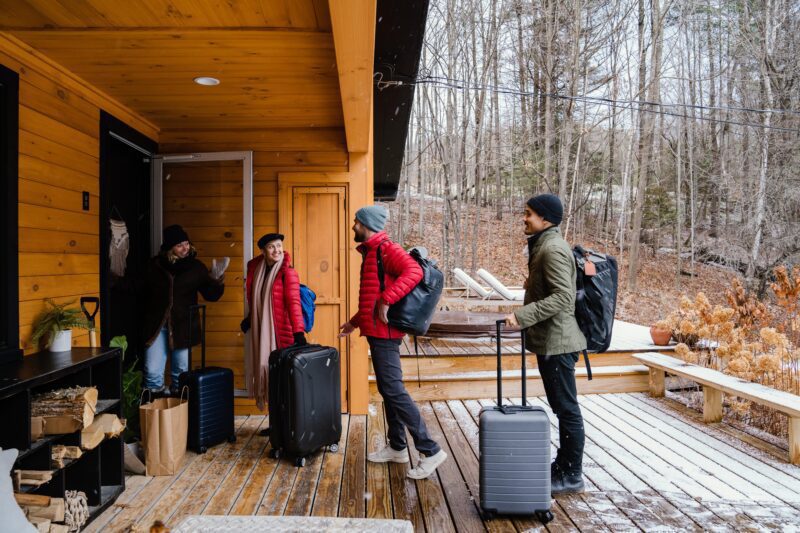Have you ever dreamed of earning cashback while booking your next vacation rental? The good news is that platforms like Airbnb make this possibility a reality. With the rise of a variety of cashback services, travelers can not only enjoy their trips but also receive a percentage back on their bookings. Unlike traditional discount methods or coupon codes, which reduce the upfront cost of a booking, cashback offers a unique way to enjoy your travel experience and get rewarded for it afterwards.
Airbnb is a platform that has revolutionized the way we travel by providing a wide array of accommodation options, from cozy apartments to lavish villas, available in countless cities around the globe. Unlike hotels, Airbnb allows guests to immerse themselves in local cultures while enjoying the comforts of home. Users can search for accommodations that best suit their needs, whether they’re looking for a romantic getaway, a family vacation, or a solo adventure. In addition to lodging, Airbnb also offers unique experiences, ranging from guided tours to cooking classes, thus enriching your travel experience with local traditions.
To successfully earn cashback from your Airbnb bookings, consider using a service like Rakuten. With Rakuten, you simply sign up and browse for the Airbnb link on their platform before making your booking. Unlike a discount or a coupon code, which might only provide a one-time reduction at checkout, Rakuten offers a percentage of your booking price back to you after your travel is complete. You can easily redeem your earnings through a check or PayPal transfer. So next time you use Airbnb for your travels, remember to check out Rakuten beforehand, and watch how the cashback adds up – allowing you to treat yourself on your next trip!
Q&A
**Q&A: Navigating the World of Airbnb**
**Q: What is Airbnb, and how does it work?**
A: Airbnb is an online marketplace that connects people looking to rent out their homes with those seeking short-term accommodations. Hosts can list their properties—whether it’s a whole house, an apartment, or just a room—on the Airbnb platform. Guests can search for listings based on various criteria such as location, price, and amenities. After selecting a property, guests can communicate with hosts through the platform, make bookings, and leave reviews afterward, creating a community of trust and feedback.
—
**Q: What types of accommodations can you find on Airbnb?**
A: The variety is part of what makes Airbnb unique. You can find everything from cozy studios and luxurious villas to treehouses, yurts, and even castles! Each listing offers its own charm and character, giving travelers a chance to experience destinations in more personalized ways compared to traditional hotels.
—
**Q: Is Airbnb affordable compared to hotels?**
A: Generally, Airbnb can be more affordable than hotels, especially for longer stays or larger groups. However, prices vary significantly based on factors like location, season, and the specific property. It’s often recommended to compare similar accommodations in your desired area to determine the best option for your budget.
—
**Q: What should guests consider before booking an Airbnb?**
A: Prospective guests should read the entire listing, check the reviews from previous guests, and look at the cancellation policy before booking. It’s also wise to communicate with the host if you have any questions or special requests. Considering the location and proximity to attractions can enhance your stay, as well!
—
**Q: What responsibilities do hosts have when listing their property?**
A: Hosts are responsible for accurately representing their accommodation, maintaining cleanliness, and providing a safe environment for guests. They should also respond to inquiries in a timely manner, set clear house rules, and ensure the availability of essential amenities. Good communication and hospitality can lead to positive reviews and repeat bookings.
—
**Q: How does Airbnb ensure guest safety?**
A: Airbnb has implemented various safety measures, including identity verification for both hosts and guests, secure payment systems, and a comprehensive review system that helps build trust within the community. Additionally, hosts are encouraged to disclose details about the property and any potential hazards to ensure that guests are aware and can make informed decisions.
—
**Q: Can Airbnb affect local communities?**
A: The impact of Airbnb on local communities is a mixed bag. On the positive side, it can boost local economies by increasing tourism and providing extra income to homeowners. However, there are concerns over housing shortages and rising rental prices in some areas due to properties being turned into short-term rentals. Many cities are now implementing regulations to balance the interests of guests, hosts, and residents.
—
**Q: What trends are shaping the future of Airbnb?**
A: The future of Airbnb is shaped by trends like remote work, which is encouraging longer stays in non-traditional destinations, and an increasing demand for unique experiences. Sustainability is also becoming crucial—guests are seeking eco-friendly options, and hosts are adopting green practices. Additionally, as competition in the short-term rental market grows, Airbnb is continually innovating its features and services to improve user experience.
—
**Q: How can I become a successful host on Airbnb?**
A: To become a successful host, focus on creating a welcoming environment, offering exceptional hospitality, and paying attention to details. High-quality photos, clear descriptions, and competitive pricing are essential for attracting guests. Engage with reviews, continually improve based on guest feedback, and stay updated on market trends to refine your offering.
—
**Q: What is the future of Airbnb?**
A: While predicting the future is always trickier than finding the perfect Airbnb, the platform is likely to continue evolving. With a focus on personalized experiences, technology integration, and sustainability, Airbnb aims to enhance its appeal to both guests and hosts. The rise of remote work may further expand its offerings as travelers seek accommodations that feel more like home, no matter where they are.


